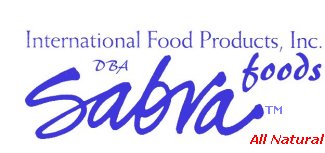| Sabra
Foods are:
100% all natural, vegetarian, vegan, kosher,
cholesterol free, healthy, low in: fat. calories, saturated fat
and sodium, high in: fiber, calcium, vitamins A and
C, a good source of iron, and rich in: antioxidants, vital nutrients
and mono-unsaturated fats.
Sabra Foods are 100% All
Natural
For your health, Sabra Foods are 100% all Natural.
The basic problem or imbalance in the average western diet is we are
eating foods high on quantity but low in quality. We are consuming WAY
to much of the `quantity' nutrients (i.e. protein, carbohydrate/sugar,
and fat) without getting enough of the `quality' nutrients that the body
needs to process these `quantity' nutrients - including minerals and
trace minerals, friendly bacteria, enzymes, antioxidants and other
biologically supporting phytonutrients only derived from live, whole
foods.
Simply put, the body is relying on us to feed it correctly. If we don't
eat a balanced diet, the body cannot maintain a balanced, healthy state.
The better we become at providing what the body needs to grow, maintain,
and regenerate the healthier we become.
Sabra Foods are Vegetarian
Sabra Foods are Vegan
A vegan (pronounced VEE-gun) is someone who avoids
using or consuming animal products. While vegetarians avoid flesh foods,
vegans also avoid dairy and eggs, as well as fur, leather, wool, down,
and cosmetics or chemical products tested on animals Veganism, the
natural extension of vegetarianism, is an integral component of a
cruelty-free lifestyle. Living vegan provides numerous benefits to
animals' lives, to the environment, and to our own health-- through a
healthy diet and lifestyle.
Sabra Foods are Kosher Certified
The Jewish religion incorporates within its tenets regimen of dietary
laws. These laws determine which food is acceptable and in conformity
with Jewish Law. The word kosher is an adaptation of the Hebrew word
meaning fit or proper. It refers to foodstuffs that meet the dietary
requirements of Jewish Law. There is a prevalent misconception
that kosher reflects the conferring of a blessing on food by a Rabbi.
There is no truth to this whatsoever. Jewish ritual does require the
recitation of a blessing prior to the consumption of food as a gesture
of appreciation and acknowledgment of the Divine source of sustenance.
However, this requirement applies to everyone, not just a Rabbi. This
has no connection with kosher requirements or status. The barometer of
kosher and non-kosher depends on two variables: the source of the
ingredients and the status of the production equipment. Kosher
certification, which is the guarantee that the food meets kosher
requirements, revolves around these two criteria.
Sabra Foods
are Rich in Antioxidants
Antioxidants are compounds that prevent or
repair damage to cells caused by pollution, sunlight, and normal body processes.
These elements cause oxidation in our body, which produce dangerous chemical
compounds called free radicals. These compounds are highly reactive and have the
potential to damage DNA, causing mutations that can result in the malignant
transformation of cells. Free radicals can easily cause harm to the immune
system, whose cells divide often. They may also be responsible for some of the
changes of aging.
We can help the body in its
ability to scavenge and destroy free radicals, before they cause harm, by
supplying it with natural substances that act as antioxidants. These substances
block the chemical reactions that generate free radicals in the first place, and
destroy the ones that have already been formed.
ra Foods are High in Fiber
Want to increase your
vitality and improve your overall well-being? Then try eating more fiber every
day. According to the American Heart Association (AHA), fiber is important for
the health of our digestive system as well as for lowering cholesterol. Dietary
fiber is a transparent solid carbohydrate that is the main part of the cell
walls of plants. It has two forms: soluble and insoluble. Soluble fiber may help
lower blood cholesterol and reduce the risk of heart disease and stroke.
Insoluble fiber provides the bulk needed for proper functioning of the stomach
and intestines. It promotes healthy intestinal action and prevents constipation
by moving bodily waste through the digestive tract faster, so harmful substances
don't have as much contact with the intestinal walls. Both the AHA and the
National Cancer Institute recommend that we consume 25 to 30 grams of fiber a
day.
Unfortunately, many people are not eating this
much fiber. The reason is the conventional animal-based Western diet, which is
high in saturated fat and low in fiber. This type of diet is causing serious
concerns. Heart disease and stroke have become major health problems in most
developed countries, and are rapidly increasing in prevalence in many lesser
developed countries. This is mainly due to the global influence of the typical
Western diet.
Recently the AHA and the FDA
(Food and Drug Administration) confirmed that coronary heart disease is the
leading cause of death in the United States, killing more people than any other
disease. It causes heart attack and angina (chest pain). A blood clot that goes
to the heart is considered a heart attack, but if it goes to the brain it is a
stroke. The AHA ranks stoke as the third most fatal disease in America, causing
paralysis and brain damage.
Eating a high-fiber diet can
significantly lower our risk of heart attack, stroke and colon cancer. A 19-year
follow-up study reported in the November 2001 issue of Archives of Internal
Medicine indicated that increasing bean and legume intakes may be an important
part of a dietary approach to preventing coronary heart disease. Soybeans and
legumes are high in protein and soluble fiber. Another study reported in the
January 2002 issue of the Journal of the American College of Cardiology also
suggests that increasing our consumption of fiber-rich foods like whole grains,
fruits and vegetables, can significantly lower the risk of heart disease.
|
|
